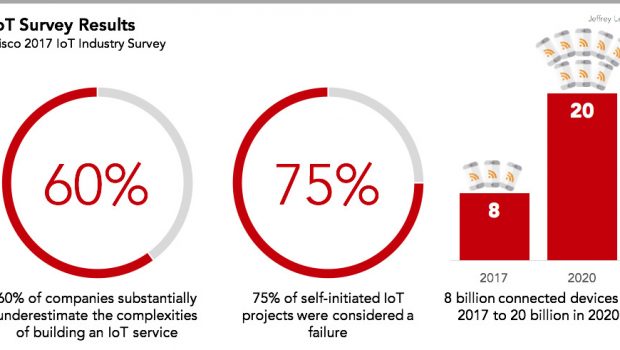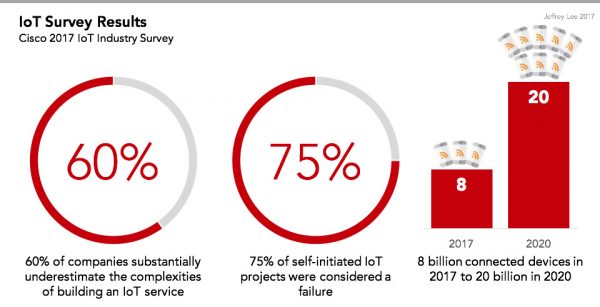3 reasons why it is hard for IoT companies to survive
Seeing the achievements and happiness of big players like Google, Apple, IBM, Microsoft, Cisco and SAP due to the footprint of the Internet of Things (IoT) into them, a lot of others got inspired and decided to take the cupid of the Internet of Things (IoT) without giving a thought, and the result? Heartbreaks.
First of all, IoT is not everyone’s cup of tea. Not all can make, drink or stick to it. Success with IoT can only be achieved if one follows the rules and requirements of it and plan out, right strategies at the right time. One should have the patience to wait and reap results, as IoT bring along with it an extra load of problems apart from the common business challenges among which we are going to understand the 3 major ones. Ready?
Image source: Jeffrey Lee / Hackernoon
#1 Lack of confidence, ecosystem and experience for the big game
Unlike others, IoT is no ordinary game. If you are getting into it just for a trial, then don’t. Enter only if you have braced yourself up to get through it no matter what or else the loss might be painful than you expected.
Next, is the ecosystem. For IoT to deliver a smooth user experience, it has to have the right compatible environment for it. As the internet connected devices like Amazon Echo, Google Home or your smartphone keep changing time to time with new updates, the platform you are offering must be fast and scalable enough to maintain the connection of things to the Internet, without causing any interruption to the users in monitoring and managing their devices in real-time and get flexible analytic reports. To make that possible, you need to update your resources.
Third, is the experience. IoT is a complex amalgamation of various hardware, software, and other digital technologies that together keep the devices connected and alive using the cloud-based technology. And one needs to have fully-focused constant attention and involvement in it for any change in the device or system requires the expertise to handle it. Here, lack of knowledge and skill won’t be of any help. The complex mechanism of IoT needs experienced minds as well. So, if you are thinking that you can adjust to what you have then you are wrong. A slight here and there can make you suffer a huge loss.
#2 Failing to understand every nook & corner of IoT
IoT industry is vast. Don’t dive in blindly assuming that nothing will go wrong and that you will reach the shore anyhow. IoT is hard and there are a lot of things in it which can give birth to difficulties in your IoT journey anytime. Hence, better prepare and make yourself aware of everything about IoT including the industry standards, protocols, IoT stacks, connected systems experience, deployment models, security, system integrators, etc. so as not to stumble upon anything that creates confusion and make you fall and lose anywhere.
Like for IoT to work one of the most important things which you can not at all compromise is connectivity. The complex IoT framework which is all about multiple interconnected devices under the cloud requires continuous data streams and unbreakable signalling on all the connected devices to ensure that no device is out of the cloud. And if you are located at such a place where the Internet infrastructure is not so advanced or the power supply is fluctuating, there is no way you can deliver uninterrupted IoT services to clients or customers. Hence, knowing IoT before investing will save you from unrecoverable damage.
#3 To fear or to fight tech giants?
This question battles the mind of every IoT startups whether to fight or stand against the big tech companies. Why? Here’s one example, have you heard of Pebble watches? It is a discontinued smartwatch developed by Pebble Technology Corporation whose funding was conducted through a Kickstarter campaign in 2012. These smartwatches faced a giant and tough competition from Apple who started formulating Apple watches during the same time. But, Pebble, despite being a small company did not give up fearing the giant Apple. Their work inspired a lot of other hardware companies to come up in spite of lacking the ecosystem and resources to compete with Apple. Pebble was later acquired by Fitbit. So you see, large-scale companies are always keeping an eye on what’s new, which company is about to break, which one has the potential to turn into a competitor, which product is breaking the records, what are people demanding the most, and so on, so that they can take it under their wings and soak in the limelight. It is upon you whether to stand up and inspire others like Pebble or give up fighting and join the giants like Nest and Ring, two new device firms who eventually took refuge under Google and Amazon respectively.
A piece of advice
What is life after all without any risks, right? Challenges and risks are everywhere, it ultimately depends upon us how you face it. You can either grab your shoes and jump in or leave them and run. Just keep in mind that the IoT industry is no scary thing, it is hard but not something to be afraid of getting into. If you have the right mix of planning and execution policies, if you know the game of IoT well, if you have gathered the required skills with you and have the confidence to nail it, you definitely will be able to ward off the above-mentioned challenges and take your IoT company to infinite heights. All the best!









![The Future of Medical Technology [Infographic]](https://technofaq.org/wp-content/uploads/2017/03/future-of-medical-technology-150x150.jpg)







